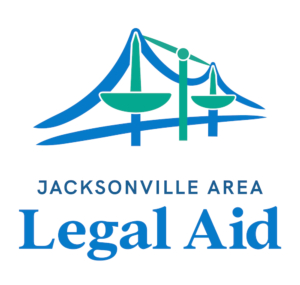
When it comes to choosing pro bono work, Carrington “Rusty” Mead looks for the most time-consuming cases that other attorneys are least likely to take, and where the clients would suffer the most dire consequences without a lawyer’s help.
“I prefer to do anything that will help people feel safe and help them be able to move forward easily in their lives, so they don’t get stuck in bad spaces. That’s what I prefer to do,” Mead said. “I’m always trying to stick my finger in a dam.”
Over two decades, beginning when he was a student at Florida Coastal School of Law, Mead has just about done it all – from domestic violence injunctions to name changes to clearing title to serving at dozens of Ask-A-Lawyer events and pro se and legal advice clinics.
“Rusty is one of the volunteers I can always go to whenever there is a difficult case or when a last-minute issue comes up, because he always says ‘Yes,’” said JALA Pro Bono Director Missy Davenport. “If he sees someone is in need of help, he finds time and finds a way to offer that help. He provides great contributions to our community, and we are so grateful for him.”
Mead was recognized in January 2021 with The Florida Bar President’s Pro Bono Service Award for the Fourth Judicial Circuit, the latest in a string of awards both within the legal profession and outside of it, including the Jacksonville Bar Association’s Young Lawyer of the Year Award in 2005 and a Fairy Godparent Award from the Jacksonville Area Sexual Minority Youth Network.
A Navy veteran and VA-accredited Veterans Benefits Attorney, Mead’s private practice focuses largely on family law matters and LGBT rights, but when it comes to pro bono work, he is willing to do just about whatever it takes.
His commitment to the people he serves sometimes goes beyond solving their legal problems. Once, when he learned that an estate planning client he was helping at a clinic was not sure exactly where his twin was buried at a local cemetery because the grave had no marker, Mead helped him find the grave’s location – and bought his family a headstone for it. After a hurricane, he gathered some friends to cut up a tree that had fallen in the yard of an older client for whom the debris was a hazard.
By the time Mead went to law school he had been volunteering in the LGBT community for 15 years. His service included raising funds to bring a mobile mammogram unit to the Pride Festival so that women who had never had a mammogram could get one.
“Lesbians are an underserved group that don’t have a lot of access to health care,” Mead said.
As a work-study student in law school, Mead initially worked on a Community Development Corporation project that involved identifying lien fields and reclaiming abandoned properties so they could be used to benefit the community.
He kept asking his JALA supervisor for more work, and it wasn’t long before he was getting involved in JALA’s Ryan White Clinic, which handles legal issues for people with HIV. And from there it was on to assisting with domestic violence cases.
“That’s kind of how I cut my teeth,” said Mead, who made a personal commitment as a new lawyer to maintaining five open pro bono cases at a time, a caseload he’s far exceeded in the decades since.
“After my work-study time was done, I just kept coming back,” Mead said. “I would triage cases, and if it was a case that involved children especially and really untoward domestic violence, or if it was a case that if there wasn’t an attorney involved something horrible might happen to an innocent party, then I would take that one.”
Mead also handles a lot of simpler issues such as name changes.
“It takes four hours of my time to do that, max,” said Mead, who went on to explain the impact those four hours can have.
“[Without a name change], you can’t get a job, especially If you’re transgender,” he said. “If your license says your name is Michelle, and you look like Michael, that can be a big issue, especially because we’ve normalized bigotry across the nation. I just want people to be safe, and I want people to be able to take care of themselves.”
He encourages lawyers to take cases outside of their practice areas, as he has done.
“Do it. There are plenty of resources at JALA that they either have there or that they can identify for you, and they have an attorney coach you along. I’ve done that with plenty of attorneys,” he said. “I’ve offered to co-counsel with younger attorneys who just want to get their feet wet and learn how to do a certain area of law. You are never disserved by learning about another area of law. It does help you in the area that you practice, even if you think it may not.”
He gave the example of clearing title to properties.
“There’s a lot of that, especially in impoverished communities,” Mead said. “Property is just sitting there because they don’t know how to get it into the proper name. And that’s pretty easy work. It’s not nearly as difficult as it may seem.”
Whether the case is complicated or relatively simple, Mead says pro bono clients are often appreciative in a way that paying clients may not be.
“A lot of times you’re capturing people right before they fall into a deep canyon they can’t get out of, and they act like you just saved them from that,” he said. “If people want to do it for some type of reward, that’s a pretty good reward right there.”



